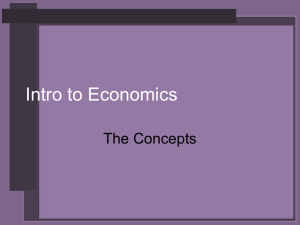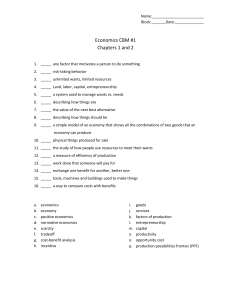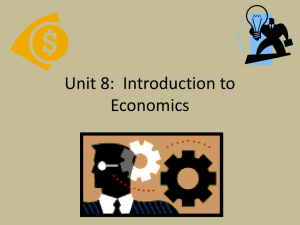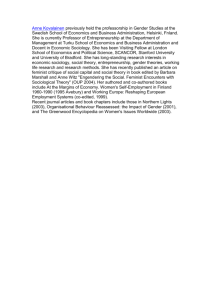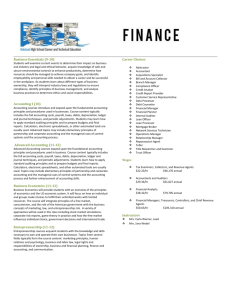entrepreneurship education as a strategies for reducing
advertisement
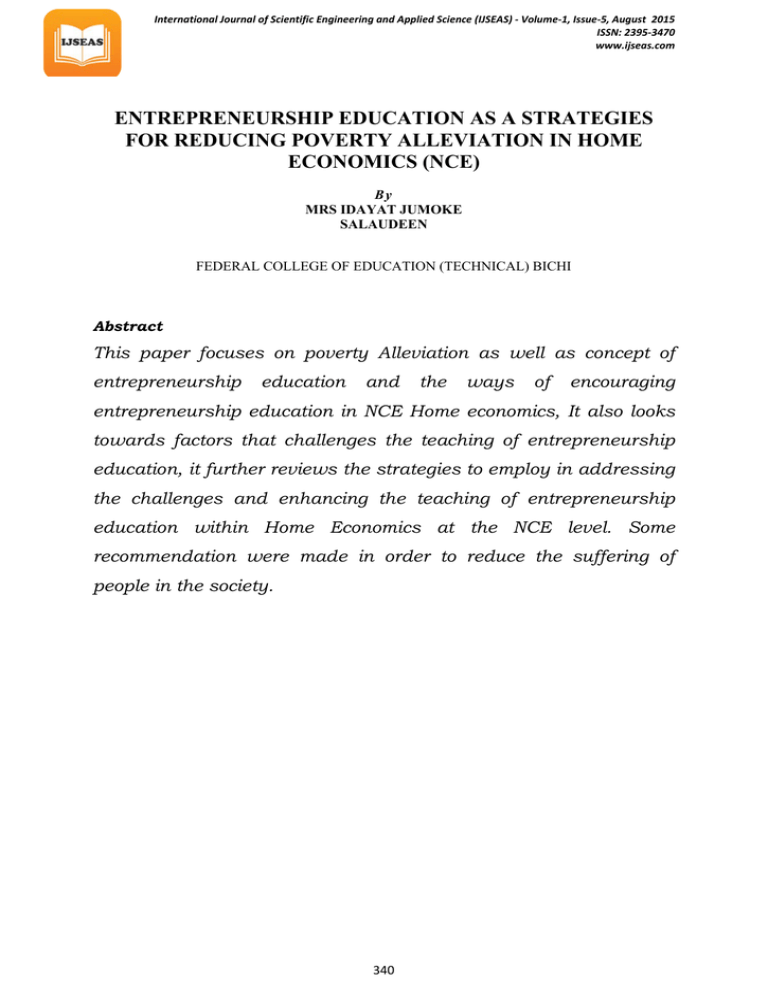
International Journal of Scientific Engineering and Applied Science (IJSEAS) - Volume-1, Issue-5, August 2015 ISSN: 2395-3470 www.ijseas.com ENTREPRENEURSHIP EDUCATION AS A STRATEGIES FOR REDUCING POVERTY ALLEVIATION IN HOME ECONOMICS (NCE) By MRS IDAYAT JUMOKE SALAUDEEN FEDERAL COLLEGE OF EDUCATION (TECHNICAL) BICHI Abstract This paper focuses on poverty Alleviation as well as concept of entrepreneurship education and the ways of encouraging entrepreneurship education in NCE Home economics, It also looks towards factors that challenges the teaching of entrepreneurship education, it further reviews the strategies to employ in addressing the challenges and enhancing the teaching of entrepreneurship education within Home Economics at the NCE level. Some recommendation were made in order to reduce the suffering of people in the society. 340 International Journal of Scientific Engineering and Applied Science (IJSEAS) - Volume-1, Issue-5, August 2015 ISSN: 2395-3470 www.ijseas.com Introduction Poverty is experienced in every human community, and varying in degree. The worse hit are those in the developing countries like Nigeria, where poverty has continued to constitute a big hindrance to the development of her people. Poverty is a state where an individual or group cannot obtain the basic necessities of life. It can equally be seen as insufficient natural and human resources and lack of capacity and capability to harness available natural resources, and mismanagement of available resources Ajekamo (2008). In additional Ajekamo (2008) confirms that of all scourge in the world, poverty is the most basic that denies human right and denies human right the benefit of their talents. Poverty alleviation can be described as a process of reducing the sufferings of the populace there by making it possible for the people to live above, the absolute poverty standard of living. Entrepreneurship education seeks to provide students with the knowledge, skills and motivation to encourage entrepreneurial 341 International Journal of Scientific Engineering and Applied Science (IJSEAS) - Volume-1, Issue-5, August 2015 ISSN: 2395-3470 www.ijseas.com success in a variety of setting. Entrepreneurship education equips people with the ability to seek investment opportunities. Through entrepreneurship education, entrepreneurship education in NCE Home Economics programme can equip student with entrepreneurship skills that will enable them create and develop enterprises in the various areas of Home Economics. This will in turn help to enhance graduate employment and reduce unemployment. The Nigeria Certificate in Education (NCE) programmes are designed among other goals. Produce highly motivated, conscientious and efficient classroom teachers for all levels of the Nigerian education system, provide graduates with the intellectual and professional background adequate for their assignment and make them adoptable to changing situations fed republic of Nigeria (2004). The strategies for the attainment of the goal for the integration of entrepreneurship education in home economics include the planning of specific objectives, learning experience, organization and integration of the learning experiences, instructional methods and facilities and evaluation techniques for assessing 342 International Journal of Scientific Engineering and Applied Science (IJSEAS) - Volume-1, Issue-5, August 2015 ISSN: 2395-3470 www.ijseas.com the attainment of specific objectives, Lemchi and Anyakona, (2006) says the specific objectives are of utmost importance to curriculum development particularly helpful and guides implementation in selecting as learning, they are selecting instructional materials and also evaluation techniques. Home economics hinged on the specific objectives. This content should include, among others, business ownership, entrepreneurial responsibilities, product development, record/book keeping and market segmentation Fayolle (2005). Facilities and methods of teaching entrepreneurship education should be suited to the objectives. Hindle (2007) noted that there is no universal method of teaching entrepreneurship education. • Factors that challenge the teaching of entrepreneurship education in home economics. There are several factors that challenge the teaching of entrepreneurship education in NCE Home economics include: • Teacher’s competency competency: as an Weidmann attitude, (1977) behaviour, defined skill or understanding at a specified level of performance home 343 International Journal of Scientific Engineering and Applied Science (IJSEAS) - Volume-1, Issue-5, August 2015 ISSN: 2395-3470 www.ijseas.com economics teachers who are not competent in entrepreneurship education may not be able to teach it. • Absence of relevant textbooks-since education is a new inclusion into entrepreneurship home economics curriculum, there is also the problem of lack of textbooks in the area. This has neatly challenged education Idibie (2004) also noted the teaching and learning without textbooks would means a lot of memorization as well as make the words of the teacher final authority. This does not pave ways for competency in entrepreneurship. • Lack of facilities: It is glaring that most college of education have not been able to provide adequate facilities and equipment to cope with the increasing enrolment of the students, Obunadike (2009) noted that lack of laboratory facilities compel home economics teachers to use inappropriate method of teaching. This situation stifles entrepreneurial skill amongst students. • Lack of fund: inadequate funding of college has often affected the teaching and learning of home economics. It is 344 International Journal of Scientific Engineering and Applied Science (IJSEAS) - Volume-1, Issue-5, August 2015 ISSN: 2395-3470 www.ijseas.com the major cause of inadequate facilities and equipment in the institution. Poor enterprise culture; Due to lack of centre and enterprises, students are faced of getting appropriate establishment for adequate training with the problems their work experience. They end up attaching themselves toroad side tailors and other home economics related wrong enterprising enterprises, where they often acquire culture and skills. This is contrary to the goals of students industrial work experience science (SIWES) which is expected to provide students with opportunities of exposure to practical experiences and relating then knowledge and skills learnt in the classroom to the real world of work ONU (2008). - Strategies for addressing the challenges and enhancing the teaching of entrepreneurship education in order to reduce poverty alleviation in entrepreneurship knowledge, attitudes and skills that can be taught within the NCE Home Economics programme, the following strategies can be employed; 345 International Journal of Scientific Engineering and Applied Science (IJSEAS) - Volume-1, Issue-5, August 2015 ISSN: 2395-3470 www.ijseas.com - Innovation: Innovation is change that create a new dimension of performance. It is create idea that is realized. Lucke and Katz (2003) note that Lucke innovation is the combination of synthesis of knowledge in original, relevant, value new products, processes or services. Innovation typically involves creativity but is not identical to it Kaka and Agwa (2007). Home Economics teachers at the Colleges of Education need to provide an entrepreneurship education that will stir up the knowledge, skills and attitudes of the NCE students so that they can be more innovative. This will enable them introduce new ideas into the economy, formulate new goals, initiate new methods of production, new methods of distribution or carry out new organization of an industry Gula and Ewubare, (2007). • In - service training NCE Home Economics teachers should be given opportunity for in-service training so that they can brace up in with the changes in the curriculum. Adiotomre (2005) noted that re-training of teachers gives room for professional growth which in turn enhances creativity and productivity. 346 International Journal of Scientific Engineering and Applied Science (IJSEAS) - Volume-1, Issue-5, August 2015 ISSN: 2395-3470 www.ijseas.com • Research: - This is another strategy for addressing the challenges of the teaching of entrepreneurship education. Anyakoha (2001) noted that Home Economics is constantly evolving and adapting to a world where apreed of change is increasing. Its goal poses enormous challenges to the field and the practitioner hence research in Home Economics becomes imperative so that issues that pose challenges can be determined and address appropriately. For instance, the issues of entrepreneurship education emerged as a result of research. College management should endeavour to provide recent textbooks should update themselves through research, seminars, workshops and conference. This will also help to improve their competencies. • Improvement of teaching facilities and techniques: Anyakoha (2001) stressed the need to be willing to learn improve on old methods and techniques of teaching. The NCE Home Economics educators should explore new techniques/methods of teaching the entrepreneurship courses so that the students can cope with dynamic society at graduation. For instance, they should carry out entrepreneurial 347 International Journal of Scientific Engineering and Applied Science (IJSEAS) - Volume-1, Issue-5, August 2015 ISSN: 2395-3470 www.ijseas.com practice in various areas of Home Economics under the supervision of their lecturers. • Improved School/Industry relationship: College and Industry should have an improved working relationship, which should enhance student’s skill acquisition. When students are sent out on industrial attachment, college should give them the necessary orientation needed to have a good rapport with the industry. • Improvisation: Olaitan and Agusiobo (1985) defined improvisation as the choice and use of alternative instructional materials which enable the teacher to obtain some carefully specified objectives Idible (2004) also define it as an act of making use of alternative materials or resources to facilitate instructional in the absence or shortage of some specified conventional instructional aids whenever it is necessary and possible, teachers and students should improvise some instructional materials needed for the teaching of this course, when the facilities and equipment are inadequate. Conclusion 348 International Journal of Scientific Engineering and Applied Science (IJSEAS) - Volume-1, Issue-5, August 2015 ISSN: 2395-3470 www.ijseas.com Entrepreneurship education is a carefully planned process that leads to the acquisition as well alleviate poverty and competencies. It seeks ton provides students with the knowledge, skills and motivation to encourage entrepreneurial success in a variety of setting. NCE Home Economics graduates are expected to be prepares for teaching and self - employment. Thus entrepreneurship education needs to be promoted within the NCE Home Economics programmes and self reliance in order to alleviate the suffering of female in the society generally. Recommendations Considering the importance of entrepreneurship education in NCE Home Economics, the following recommendations are made: > NCE Home Economics lecturers should be paragmatic, innovative and committed to the teaching of NCE Home Economics entrepreneurship education. • Opportunities for in-service training entrepreneurship education programme should be given NCE Home Economics teachers by the government. • Government should provide equipment for Colleges of Education. 349 adequate facilities and International Journal of Scientific Engineering and Applied Science (IJSEAS) - Volume-1, Issue-5, August 2015 ISSN: 2395-3470 www.ijseas.com • Government should provide sufficient grants for research while the NCE Home Economics Education should explore ways of obtaining such research grants with vigour to asses them. • NCE Home Economics lecturers should improvise when it is imperative to do so. • Government and management of Colleges of Education should produce new and entrepreneurship education. 350 relevant information on International Journal of Scientific Engineering and Applied Science (IJSEAS) - Volume-1, Issue-5, August 2015 ISSN: 2395-3470 www.ijseas.com References Ajakemo (2008) Eradication of poverty and Hunger in Nigeria: Issues and Options for Attainment of Millennium Development Goals. Anyakoha, E. U. (2001) “Research Challenges for the Nigeria Home Economics in the 21st Centry” Research Imperatives P P and Challenges for Home Economics in Nigeria: HERAN. Adiotomre, J. E. (2005) Some Strategies for Improving Primary Schools System for Economic and Social Reconstruction Educology: Current Journal of Educational Issues and Researchers and Human Resource Development. Vol. (1), Pp. 34 - 43. Fayolle, A. (2005) “Evaluation of Entrepreneurship Education: Behaviour Performing or Intention Increasing” International Journal of Entrepreneurship and Small Business: Vol. 2(1) Pp. 89 - 98. Federal Republic of Nigeria (2004) National Policy on Education Abuja NERDC. Gula, M. O. and Ewubare, M. U. (2007), Entrepreneurship Education in Home Economics, Warri: COEWA Publishers. Idibie, P. T. (2004), Organization, Teaching and Evaluation of Home Economics Curriculum in Nigeria Warri: COEWA Publishers. Kaka, H. J. and Agwa, S. I. (2007), Technological Innovations in Dress and Textiles. Lemchi, S. N. and Anyakoha, E. N. (2006) Specific Objectives for Entrepreneurship Education in the NCE Home Economics 351 International Journal of Scientific Engineering and Applied Science (IJSEAS) - Volume-1, Issue-5, August 2015 ISSN: 2395-3470 www.ijseas.com Journal of Home Economics Research Association of Nigeria (HERAN). Vol. 7. Lucke, R. and Katz, R. (2003), Managing Creativity and Innovation. Boston: M. A. Harvard Business School Press. Obunadike, J. C. (2009) Home Economics Teachers Perception of Administration Support for Teaching Creativity in Primary Schools in Anambra State. Journal of Home Economics Research. Vol.10 & 11 Pp. 153 - 161. Olaitan, S. O. and Agusiobo, O. N. (1981), Introduction to the Teaching of Home Economics, Toronto Ajohn Wiley and Sons. Onu, V. C. (2008), Repositioning Nigeria Youth for Economics Empowerment through Entrepreneurship Education Journal of Home Economics research Association of Nigeria (HERAN). Vol.9, Pp. 148 - 157. Weidmann, C. J. (1977), Planning Home Economics Curriculum for Social and Economics Development, Ibadan; Federal Ministry of Agriculture and Rural Development. 352
